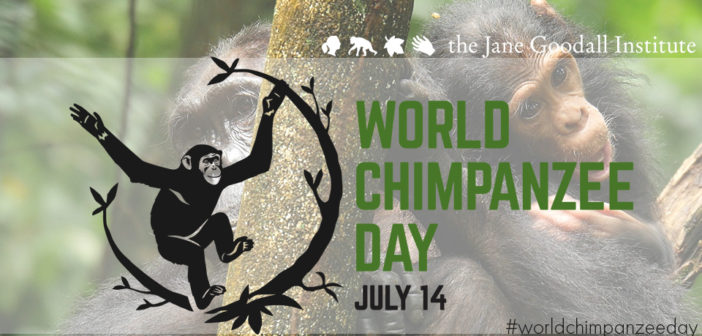International Chimpanzee Day: 14 July
(Dr. Monika Raghuvanshi and Dr. Sonika Kushwaha, Indian Biodiversity Conservation Society)
To mark the significance of some momentous events, we commemorate the days on which these events happened to take place. Other than this, certain days are celebrated to generate awareness among the masses about essential subjects like awareness against any disease, gender equality, education, poverty, etc. Similarly, to create awareness regarding the environment and its rich biodiversity, Indian Biodiversity Conservation Society prepared a Green Calendar that has all days concerned with nature. One of these important days is World Chimpanzee Day. It was celebrated for the first time in year 2019 by Jane Goodall Institute in Washington. July 14, has long been a special occasion, as it was on this day in 1960 that Dr Jane Goodall, began her pioneering research on wild chimpanzees in Gombe National Park, Tanzania. This year, there is an effort to save the chimpanzees.
Unfortunately, chimpanzees are listed as Endangered in the IUCN Red data List. At the end of the 20th century, there were an estimated 1–2 million chimpanzees in 25 countries in Africa. Current estimates suggest that there are now only 350,000 chimpanzees left in 21 African countries. They suffer from threats such as natural habitat loss, disease, fragmented populations, illegal wildlife trafficking and are still being kept as illegal pets in many biomedical research facilities around the world, as well as roadside attractions and unaccredited zoos.
The Jane Goodall Institute is doing important work to stop these threats and save chimpanzees.
Humans and chimpanzees are the main members of the Apes species. Sixty million years ago, the ancestors of humans and chimpanzees were the same. The brain of a chimpanzee is half the size of a human. Chimpanzees have an average lifespan of up to 40 years. Chimpanzees live in hierarchies in which more than one member may be dominant, suppressing the members below through displays of power.
Interesting facts about Chimpanzees and their intelligence
• Chimpanzees are capable of making strategies and are deceitful.
• They use stone and stick tools for digging and extracting termites.
• They communicate through signs and sounds.
• Chimpanzees perform mourning, courtship, rain dance etc.
• Chimpanzees eat fruits, insects, eggs and meat. Hence they are omnivores.
• Chimpanzees can be infected with diseases such as measles, herpes, hepatitis B, etc.
• Chimpanzees are 6 to 7 times stronger than humans.
• They can learn human sign language.
• When ill, they consume medicinal plants to cure themselves.
The hoolock gibbon is the only ape found in India, belonging to the hoolock genus of the gibbon family of Hylobatidae. Unfortunately, other apes such as gorillas and chimpanzees are not native of India and can be found in some of the zoos.

